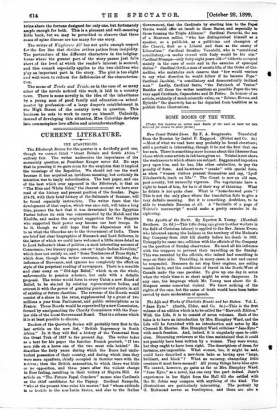CURRENT LITERATURE.
THE VARTERLIES.
The Edinburgh Review for the quarter is a decidedly good one, though we cannot think "Great Britain and South Africa" entirely fair. The writer underrates the importance of the suzerainty question, as President Kruger never did. He says that in pressing it we gave room for the suspicion that it implied the vassalage of the Republics. We should not use the word because it has acquired an invidious meaning, but certainly its Intention was to imply subordination. The best paper, and one of the best which ever appeared in the Edinburgh, is that on " The Blue and White Niles," the clearest account we have ever read of the history and present position of the Soudan. Pages 274-75, with their brief history of the Sultanate of Sennaar, will be found especially instructive. The writer fears that the development of that region, which was once rich, will take a long time, presses the fact that it was devastated by the Egyptian Pashas before its ruin was consummated by the Mahdi and the Khalifs, and makes the original suggestion that the Beggars who supported their power may become our best troops. So be it, though we still hope that the Abyssinians will be to us what the Ghoorkas are to the Government of India. There are brief but clear biographies of Bismarck and Lord Selborne, in the latter of which we could have welcomed a little more detail as to Lord Selborne's ideas of politics ; a most interesting account of Connemara ; two literary papers, one on "Anglo-Indian Novelists," which does not satisfy us, and "Some Tendencies of Prose Style," which does, though the writer overrates, to our thinking, the influence of Stevenson, and ignores too completely the effect on style of the perpetual reading of newspapers. There is a sensible and clear essay on "Old-Age Relief," which is, on the whole, unfavourable to pension schemes, but ends with a definite proposal. The writer would form in every Union a new Board of Relief, to be elected by existing representative bodies, and entrust it with the power of granting pensions and grants in aid of existing or future charities. The revenue of the Boards would consist of a share in the rates, supplemented by a grant of two millions a year from Parliament, and public subscriptions as in France. These Boards would be supervised by anew Commission, formed by amalgamating the Charity Commission with the Poor. law side of the Local Government Board. That is a scheme which it is at least possible to discuss.
Readers of the Quarterly Review will probably turn first to the last article on the new list, "British Supremacy in South Africa." In it they will find a history of the Transvaal from the Great Trek of 1887 to the present day. The writer takes as a text for his paper the familiar French proverb, "If two men ride on a horse one of the two must ride behind." He describes the forty years during which the Boers had undis- turbed possession of their country, and during which time they were mere squatters, chiefly occupied in frontier wars with the nitives ; then the British annexation, to which there was little or no opposition, and three years after the violent change in Boer feeling, resulting in their victory at Majuba Hill. An article on "The Future Papal Conclave" names nine Cardinals as the chief candidates for the Papacy. Cardinal Rampolla, "who at the present time rules his master," but "whose attitude is to la,stile to the non-Latin States, and also to the Italian Government, that the Cardinals by electing him to the Papal throne would offer an insult to these States, and especially to those forming the Triple Alliance." Cardinal Parocchi, the eon of a Mantuan miller, "who has distinguished himself as a speaker, as a publicist, as a politician and champion of the Church, first as a Liberal and then as the enemy of Liberalism." Cardinal Serafino Vanutelli, who is "considered conciliatory,—a modus virendi with Italy would be his aim." Cardinal Svampa--only forty-eight years old—" hitherto occupied mainly in the cure of souls and in the exercise of episcopal duties." Cardinal Gotti, a man of ascetic life, of the Order of Car- melites, who maintains such reserve that "few would venture to say what direction he would follow if he became Pope." Cardinal Jacobini, "a conciliatory and democratically inclined man." Lastly, Cardinal Sarto, "the Patriarch of Venice." Besides all these the writer mentions as possible Popes the two very aged Cardinals, Capecelatro and Di Pietro. In honour of an article, evidently of much scientific value, on "Zebras, Horses, and Hybrids" the Quarterly has so far departed from tradition as to publish three illustrations.






































 Previous page
Previous page